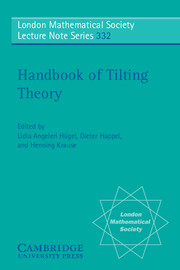Book contents
- Frontmatter
- Contents
- 1 Introduction
- 2 Basic results of classical tilting theory
- 3 Classification of representation-finite algebras and their modules
- 4 A spectral sequence analysis of classical tilting functors
- 5 Derived categories and tilting
- 6 Hereditary categories
- 7 Fourier-Mukai transforms
- 8 Tilting theory and homologically finite subcategories with applications to quasihereditary algebras
- 9 Tilting modules for algebraic groups and finite dimensional algebras
- 10 Combinatorial aspects of the set of tilting modules
- 11 Infinite dimensional tilting modules and cotorsion pairs
- 12 Infinite dimensional tilting modules over finite dimensional algebras
- 13 Cotilting dualities
- 14 Representations of finite groups and tilting
- 15 Morita theory in stable homotopy theory
- Appendix: Some remarks concerning tilting modules and tilted algebras. Origin. Relevance. Future.
5 - Derived categories and tilting
Published online by Cambridge University Press: 25 May 2010
- Frontmatter
- Contents
- 1 Introduction
- 2 Basic results of classical tilting theory
- 3 Classification of representation-finite algebras and their modules
- 4 A spectral sequence analysis of classical tilting functors
- 5 Derived categories and tilting
- 6 Hereditary categories
- 7 Fourier-Mukai transforms
- 8 Tilting theory and homologically finite subcategories with applications to quasihereditary algebras
- 9 Tilting modules for algebraic groups and finite dimensional algebras
- 10 Combinatorial aspects of the set of tilting modules
- 11 Infinite dimensional tilting modules and cotorsion pairs
- 12 Infinite dimensional tilting modules over finite dimensional algebras
- 13 Cotilting dualities
- 14 Representations of finite groups and tilting
- 15 Morita theory in stable homotopy theory
- Appendix: Some remarks concerning tilting modules and tilted algebras. Origin. Relevance. Future.
Summary
Abstract
We review the basic definitions of derived categories and derived functors. We illustrate them on simple but non trivial examples. Then we explain Happel's theorem which states that each tilting triple yields an equivalence between derived categories. We establish its link with Rickard's theorem which characterizes derived equivalent algebras. We then examine invariants under derived equivalences. Using t-structures we compare two abelian categories having equivalent derived categories. Finally, we briefly sketch a generalization of the tilting setup to differential graded algebras.
Introduction
Motivation: Derived categories as higher invariants
Let k be a field and A a k-algebra (associative, with 1). We are especially interested in the case where A is a non commutative algebra. In order to study A, one often looks at various invariants associated with A, for example its Grothendieck group K0(A), its center Z(A), its higher K-groups Ki(A), its Hochschild cohomology groups HH * (A,A), its cyclic cohomology groups …. Of course, each isomorphism of algebras A → B induces an isomorphism in each of these invariants. More generally, for each of them, there is a fundamental theorem stating that the invariant is preserved not only under isomorphism but also under passage from A to a matrix ring Mn A, and, more generally, that it is preserved under Morita equivalence.
- Type
- Chapter
- Information
- Handbook of Tilting Theory , pp. 49 - 104Publisher: Cambridge University PressPrint publication year: 2007
- 26
- Cited by



